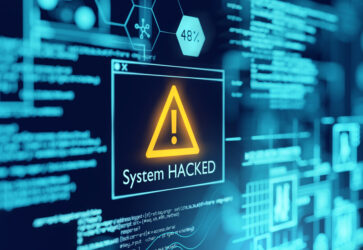Cybersecurity’s Trillion-Dollar Gold Mine
Anthony Summers|September 12, 2023

A Note From Amanda: Tomorrow’s the big day! Alpesh is going live with his upgraded, AI-powered stock-picking strategy… and you can claim a front-row seat! Join us tomorrow at 2 p.m. ET at Alpesh’s FREE AI Super Trader Summit to see the shocking results of his research… and get a free stock pick just for coming. Click here to reserve your spot.
Here’s a question for you…
What’s the most important commodity in the world today?
A century ago, the answer would have been gold or coal. Gold was the world’s currency… and coal was the fuel of choice across the industrial world.
Boy, has a lot changed since then.
Today, neither gold nor coal holds the status it once did. Instead, something quite different runs the world… something you can’t even touch…
Information.
Think about it…
We live in an increasingly digital world. We work, play, shop and socialize online more than ever.
In fact, many of the world’s most valuable companies specialize in handling all of the digital data we create… especially personal data.
But as our lives have become more digital, so has criminal activity.
Cybercrime – things like phishing scams, data breaches and fraudulent tech support schemes – has skyrocketed over the last 20 years.
It’s also becoming more expensive.
.jpg)
Last year, cybercrime cost Americans over $10 billion, marking an 18-fold increase over the past decade. These costs have been going up by about 35% each year since 2001.
In another 10 years… cybercrime could cost us a whopping $200 billion.
The growing need to protect and secure our personal data has pushed IT and cybersecurity spending into the hundreds of billions. In the coming decade, this could turn into a nearly trillion-dollar global industry.

But as cybersecurity evolves, so do cyberthreats.
Not So Friendly
Take AI, for example…
Even now, an AI revolution in cybercrime is underway. There’s a new wave of scam calls and text messages that use generative AI to mimic the writing styles and voices of a target’s friends and family. These scams attempt to deceive people into revealing personal information.
Imagine receiving an email from your “boss” asking you to make a purchase using the company card… getting a text from your “spouse” claiming they’ve forgotten your debit card PIN… or receiving a phone call from your “best friend” seeking bail money.
These scenarios aren’t hypothetical. They’re already happening.
However, as AI-powered cybercrime surges, so will the demand for AI-powered cybersecurity.
For instance, machine learning models can swiftly identify internal security vulnerabilities and external cyberthreats – often better than humans can. These models can also help us create more sophisticated code that’s tougher for hackers to crack.
Zscaler (ZS) and CrowdStrike (CRWD) are two big cybersecurity firms that have already started using generative AI in their cyber solutions.
But here’s what I’m most excited about…
Blockchain technology holds great promise in this space.
Scammers Blocked
Since a blockchain uses a decentralized record, changes to that record must be verified by a widely distributed network of computers. Blockchain technology works by keeping records in a bunch of different places instead of just one.
This makes it nearly immune to certain kinds of cyberattacks.
Take a distributed denial-of-service (DDoS) attack, for example. Incidents of this common cyberattack grew 47% in the first quarter.
In a DDoS attack, a bunch of computers gang up to overwhelm a website or service and make it crash. A blockchain-based network would be hard to take down with a DDos attack because it’s not centralized.
Another advantage of using blockchain for cybersecurity is its built-in data encryption.
When information is recorded on a blockchain, an algorithm is used to jumble it up so that it looks random, which keeps it secure and private. The only way to unscramble and access the information is by using a special encryption key.
This adds a layer of privacy to our data that keeps us better protected.
AI and blockchain technologies are the future of cybersecurity. The companies that combine these two technologies will profit handsomely.
The fate of our most precious commodity – our data – depends on them.
I will be keeping a close eye on this space and will share the best opportunities I find.

Anthony Summers
Anthony Summers is the Director of Strategic Trading for Manward Press and is a contributor to Manward Financial Digest, Manward Trading Tactics and Manward Letter. He is a former senior analyst for The Oxford Club, where he closely worked with some of our nation’s sharpest financial minds for nearly a decade. Anthony is a self-styled “conservatively aggressive trader” and has earned a reputation for developing unique trading strategies that focus on low-risk, high-return opportunities in both stock and options markets.



